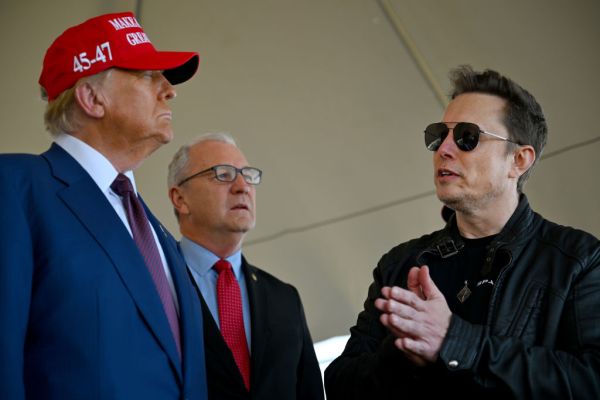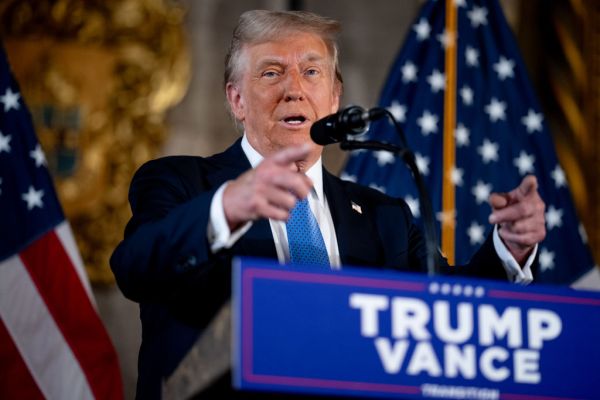The most traditionally predictable legislative cycle in politics keeps getting harder to predict.
Yesterday I ran through how must-pass spending bills typically become law nowadays when Republicans control the House. The speaker tries to find a compromise that can unite his conference, discovers that fiscal conservatives won’t support anything, then has to make a deal with Democrats that leaves the eternally furious populist right, well, furious. The bill passes with bipartisan support and then, a year or so later, we do it all over again.
It’s become so standardized that it deserves a Schoolhouse Rock episode.
This time is different. A compromise bill backed by Speaker Mike Johnson and his Republican majority was en route to passage when the richest person who’s ever lived piped up and incited a last-minute grassroots revolt against it, sinking it. (America is also overdue for a Schoolhouse Rock episode on oligarchy.) Johnson then offered a new bill that included many of the same provisions but tossed in a two-year extension of the debt ceiling to make Donald Trump happy. Dogmatic fiscal conservatives like Rep. Chip Roy were appalled and vowed to oppose it, but Trump and his prime minister, Elon Musk, endorsed the proposal.
And to make sure the House GOP understood that he meant business, Trump hopped onto social media on Thursday afternoon to attack Roy and encourage a primary challenge to the Texan in 2026.
One might have thought that would be enough to minimize Republican defections during the floor vote. After all, the predictable result whenever Trump brings down the hammer on his party is that everyone, or nearly everyone, rolls over. A few truly committed deficit hawks like Roy and Rep. Thomas Massie might hold out for a while, but the rest of the conference would cower as usual. When Johnson called the roll on his Plan B legislation on Thursday evening, I assumed all but a handful of Republicans would support it.
No fewer than 38 of them ended up voting no, Trump’s and Musk’s support be damned. The bill went down in flames. A surprisingly unpredictable process had taken another unexpected turn.
The spirit of the Tea Party, supposedly exorcised by Trump in 2016, had returned to haunt the GOP for a night. Why? And is it back for good?
Two theories.
The simplest explanation for the floor revolt is that Trump’s sudden demand for a debt-ceiling hike triggered House fiscal hawks ideologically in a way that no other budgetary measure would or could.
Using the debt ceiling as leverage to extract spending cuts is part of their political DNA. It was the centerpiece of the Tea Party’s boldest act of brinkmanship during the Obama administration. Populist conservatives have been willing to betray nearly everything they ever believed in order to serve Trump, but asking them to raise the debt ceiling without reducing spending—six months before it’s necessary—contradicts their stated governing ethos so starkly that even they couldn’t resolve the cognitive dissonance.
Some House Republicans have never voted to raise the debt ceiling, in fact. Now their leader is asking them to extend it until 2029 or to repeal it altogether in order to liberate him from any fiscal constraints during his second term as president. To make matters worse, some of the right’s favorite members of Congress demanded major concessions from President Joe Biden in exchange for hiking the debt ceiling as recently as last year.
There is a limit to GOP hypocrisy on spending, it turns out. It’s like the speed of light, seemingly boundless but not quite.
So that’s one theory of what happened on Thursday. The debt ceiling is a singular bugaboo for fiscal hawks, a political third rail that Trump foolishly asked them to touch. They couldn’t do it—but that doesn’t mean they won’t go along with most anything else he wants to do on spending in a second term. If that’s the case then the resistance they demonstrated to Johnson’s Plan B likely won’t recur during the next administration. It was a one-off.
Another theory circulating among political junkies, though, is that the Tea Party never went away entirely. “The bottom line is there’s still a significant bloc of GOP votes that’s anti-establishment in the small-government way more than the pure Trump way,” Semafor’s Benjy Sarlin observed, “which means the [next House] majority is going to be functionally nonexistent a lot of the time.” Elections analyst Sean Trende agreed: “Even in 2010 there was a split between the ‘populist’ Tea Party wing and the ‘purifying’ Tea Party wing and it is busting wide open before our eyes.”
If that’s true then Thursday evening’s vote wasn’t a one-off. Small-government populists are much diminished since their 2010 heyday, but there are still enough of them left in the House to drive the agenda, perhaps, given how narrow the GOP’s majority next year will be. On this theory, the revolt against Johnson’s bill wasn’t a narrow Pavlovian reaction to the debt ceiling; it was a broader shot across the bow of Trump’s White House to let everyone there know that runaway deficits won’t be tolerated in a government controlled by Republicans the way they were in 2017-18. If the White House wants more tax cuts, it had better be prepared to deal on spending.
And if Trump thinks he can browbeat them into submission the way he tried with Roy yesterday, he may be mistaken. There’s strength in numbers: He might be able to focus the base on primarying a few dissident conservatives. But 38 of them? For doing what the party’s been promising to do since Reagan 1.0?
Sarlin and Trende are right that there are many House Republicans who are primarily Trumpist (i.e. culturally populist) and some who are primarily purist (i.e. fiscally conservative), and that the vote on Johnson’s new bill pitted them against each other. But I think that’s too simple. There’s a third group, and whether we see future revolts over spending during Trump’s term may depend on whom they feel they owe their allegiance to.
Which brings us back to Prime Minister Musk.
The third faction.
The third group are Republicans who don’t care much about spending per se but are eager to glom onto whatever the right’s next anti-estalishment fad might be.
They’re not sincere fiscal hawks like Roy and Sen. Rand Paul. They’re not earnest Trump worshippers like Rep. Marjorie Taylor Greene. They’re whatever they need to be to protect their right flank ahead of their next primary.
Until this week, the safest way to be what you needed to be to keep populist voters off your back was to blindly follow orders from Trump. But as of Wednesday, that’s no longer true: In some cases going forward, following orders from Elon Musk might be the safe play.
And as it happens, Elon’s top political priority right now is shrinking government.
We can thank Trump for that. When he created the Department of Government Efficiency (DOGE) for Musk (and Vivek Ramaswamy), he staked Musk’s ego on his ability to find trillions of dollars of spending in the federal budget to cut. By doing so, he made fiscal conservatism politically relevant in a way that it hasn’t been for almost a decade. Elon has an enormous popular following; now that his reputation is invested in reducing the size of the federal government, tens of millions of his fans will be invested in it too.
Which would be fine for Trump if he were devoutly committed to cutting spending. He isn’t.
He wants as few constraints on his agenda as possible in his second term, which of course is why he’s suddenly made eliminating the debt ceiling a priority. You don’t push something like that if you’re keen to make government smaller—on the contrary. Yet by putting Musk in charge of DOGE, he’s handed the second-most influential figure on the American right a mandate to make spending cuts a matter of intense political interest for grassroots populists. Er, why would he do that?
Chris Hayes of MSNBC savored the irony: The “[J.D.] Vance version of MAGA-ism leaves behind the (largely unpopular) austerity fetish and deficit/spending rhetoric of the Tea Party, one of Trump's successful innovations. But Musk is intent on bringing it all back!” Sarlin went further by noting that there’s reason to think Elon’s agenda might win out over Trump’s in the long run. “Trump’s a lame duck, which is one less commented-on aspect of his next four years,” he said. “If you’re [a Republican] looking to cultivate a brand as a conservative warrior, which seems the safer long-term bet if you have to choose—Trump’s support or [Musk’s] PAC money?”
By making a figure with so much cultural influence his de facto budget czar, Trump has created a needless risk to Trumpism. It might be the first major mistake of his second term and the best thing to happen to fiscal conservatives since the Tea Party wave in the 2010 midterms.
If you believe that Elon’s commitment to responsible spending is sincere and durable, then the political incentives for the third House Republican faction I described earlier could get interesting in Trump’s second term. With Musk supplying them with political cover and populist cred, “soft” fiscal hawks might be emboldened to become harder. We really might see more floor revolts against irresponsible spending championed by the Trump White House. Thursday wouldn’t be a one-off.
I don’t believe Musk’s commitment is sincere or durable.
A poster, not a conservative.
The thing to remember about Elon is that he’s still relatively new to this—right-wing politics, red-pilled populism, Trumpism vs. conservatism, all of it.
He’s not some Reaganite fiscal warrior who’s been yearning for years to impose spending discipline on our profligate government. He’s a CEO who prides himself on his ability to identify dead weight in his operations and to cull it. That’s the root of his interest in DOGE, I suspect: It’s a business challenge, not a deeply rooted ideological commitment of the sort Chip Roy and Rand Paul feel.
And because those roots aren’t deep, the odds are good that he’ll grow frustrated and bored with it and eventually move on.
Musk’s turn to the right politically is also impossible to separate from his manic use of social media, making it difficult to tell cause from effect. Scroll through his Twitter timeline and you’ll find him posting at a remarkable clip for a man of unimaginable wealth who leads three major companies and a government commission. With the money he’s made, Elon could do anything he likes; somehow the thing he most likes to do is tweet.
Is he an avid political social media user because he’s just that committed to his right-wing views? Or is he that committed to his right-wing views because he’s an avid social media user, addicted to the adulation populists have showered on him for becoming a reliable contrarian critic of the liberal establishment?
Yesterday I compared his sinking of Mike Johnson’s bill to a prank that a mega-rich egomaniac might play to amuse himself, but that’s not quite right. More likely is that Musk, the social media junkie, got caught up in a favorite pastime of right-wing slacktivists—screeching about how the latest legislative compromise between Republicans and Democrats is an unforgivable betrayal of The People and distorting its provisions to suit that narrative. It’s not that the spending in the bill offended him deeply, perhaps; it’s that House Republicans are a favorite whipping boy of populists who aren’t allowed to criticize their party’s leader and their irresponsible spending habits are always a convenient pretext to lash them.
Maybe Elon attacked the bill for the same reason other MAGA influencers did—to bank populist credibility with his social media followers—but forgot that he’s, you know, Elon Musk. He’s not a slacktivist. House Republicans are afraid of him and have good reason to be, so the bill tanked. Oops.
If you think I’m underestimating how serious he is about spending, consider that he followed his hourslong tirade against the compromise bill on Wednesday by meekly endorsing Mike Johnson’s Plan B, which included much of the same spending and would have raised the debt ceiling through the end of 2027. To justify it as an upgrade, Elon was reduced to lamely comparing the number of pages in the first bill to the number in the second.
That’s not serious. In fact, if you had to categorize Musk as primarily a cultural populist or a fiscal conservative per the distinction drawn by Benjy Sarlin and Sean Trende, you’d surely categorize him as the former.
It was Musk’s hostility to the “woke mind virus” that drew him to the right. Since becoming a MAGA hero, he’s amplified populist anxiety about the Great Replacement (including the supposed role of Jews in orchestrating it), the alleged dangers of the COVID vaccine, and election-rigging. On Friday morning he took time out from his effort to muscle the House GOP to post, “Only the AfD can save Germany,” referring to a far-right political party in that country that somehow keeps stumbling into scandals involving Nazism.
He’s not the second coming of Ronald Reagan. He’s a Twitter chud who happens to have $450 billion. It’s not cutting spending to which he’s devoted, it’s finding vectors to demagogue right-wing scapegoats like the House GOP to earn cheers from the cheap seats. To understand how deeply confused—or nihilistic—his populist cohort has become about the policies it ostensibly supports, take an Excedrin and have a look at some of the idiotic replies Chip Roy received on Musk’s platform when he tried to explain why he opposed Johnson’s Plan B.
Populist politics, in practice, isn’t about advancing any spending agenda. It’s about defining enemies and bludgeoning them with any weapon to hand. That’s what Musk did when he tanked Johnson’s first bill on Wednesday, I think.
If I’m right about all of that then, no, there won’t be any Elon-backed House floor revolts against Trump’s spending over the next four years. Musk may sincerely prefer a more fiscally responsible government in principle, but he isn’t going to risk alienating a gigantic chunk of his social media following by going to war with Trump over it, no matter how indifferent the new president ends up being about DOGE’s work. If the third faction in the House GOP is forced to choose between serving Trump and balancing the budget, Elon won’t push them. There’s no doubt which they’ll choose.







Please note that we at The Dispatch hold ourselves, our work, and our commenters to a higher standard than other places on the internet. We welcome comments that foster genuine debate or discussion—including comments critical of us or our work—but responses that include ad hominem attacks on fellow Dispatch members or are intended to stoke fear and anger may be moderated.
With your membership, you only have the ability to comment on The Morning Dispatch articles. Consider upgrading to join the conversation everywhere.